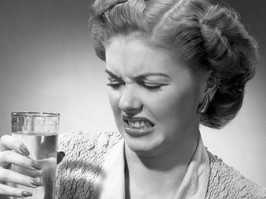dear asking for a friend,everyone knows about the ‘beer belly,’ heck, my boyfriend has a really big one. but now i am hearing a lot about the ‘wine belly.’ is this a thing? it has me a little worried.signed, happy hourdear happy hour,after a stressful day, a glass of wine can help take the edge off and if you enjoy it occasionally and responsibly, you probably don’t have to worry about belly fat. however, if you frequently overindulge, you might notice a change in your waist line.according to
adrienne ngai, a registered dietitian, nutritionist, healthy eating and weight loss coach, too much alcohol can disrupt your body’s fat burning process.“alcohol can decrease fat oxidation from the liver and other organs, and when alcohol is consumed above your caloric needs, it causes fat to be stored in our bodies,” she says. “this is because alcohol affects our liver’s function to burn fat and the by-product of digesting alcohol in our body leads to suppressing fat oxidation, therefore producing fat stores.”when it comes to wine, it’s actually not that hard to end up with calorie overload — a
five ounce glass of rose, red or white wine with a 12 per cent of alcohol content can contain up to 150 calories per serving — equivalent to eating half a burger. and if you’re drinking wine with higher alcohol content, you’ll end up with more calories.dietary
guidelines suggest that moderate alcohol consumption is up to one drink per day for women and two drinks per day for men. seven or more drinks per week is
considered excessive or heavy drinking for women, while for men, 15 drinks or more per week is deemed to be excessive or heavy drinking. going above the suggested limits can cause health complications, such as inflammation and scarring of the liver that may be fatal, and lead to
certain cancers, including head and neck cancer, esophageal and liver cancer, breast and colon cancer, melanoma, prostate, and pancreatic cancer.but it’s not all bad news. while excessive drinking can be problematic, enjoying an occasional glass of red
wine may be good for your health. red wine tends to be high in resveratrol, epicatechin, catechin and proanthocyanidins —
antioxidants that can help protect against heart disease, reduce the risk of dementia and alzheimer’s disease, lower cholesterol, regulate blood sugar, improve digestion and symptoms of depression. and by the way, while beer tends to stay out of the health-benefits limelight, a pint has some
benefits too in terms of staving off heart disease and cancer.which leads us to the next important point: if you are careful, you can have your cake, and, er, ‘drink’ it too. although belly fat can build up over time as a result of drinking too much, when enjoyed occasionally, alcohol can still be a part of your weight loss plan, according to ngai.“the very basics of weight loss is consuming less calories than your body needs to maintain your current weight,” she says.so basically, think moderation.as a country, we consume a lot of booze — more than
50 per cent above the world average. and since the
covid-19 outbreak, new data suggests that canadians are drinking more — about 25 per cent of those surveyed, most of whom were aged 35 to 54, said that their alcohol consumption has increased. boredom, lack of regular schedule and stress seem to be the main drivers of increased alcohol consumption among canadians.
if you too have recently increased your alcohol intake, consider cutting back and read the labels for calories, alcohol and sugar content, so you can choose more wisely. dry reds, such as pinot noir, cabernet sauvignon and shiraz, and dry whites, such as pinot grigio, chardonnay and viognier contain less sugar. you can also choose from low-sugar sparkling wines, such as brut and extra brut. avoid dessert wines — dry whites, like riesling and chenin blanc and reds, like cabernet, zinfandel and grenache have the highest sugar content per serving.it’s also worth reflecting on whether or not you are using alcohol to manage stress and anxiety. if so, try a little exercise, journaling or meditation instead.
is there something about health that you (or a friend, wink, wink) have always wondered about, but are too embarrassed to ask? send a note to info@healthing.ca. we promise your ‘friend’s’ secret — and identity — is safe with us.don’t miss the latest on covid-19, reopening and life. subscribe to healthing’s daily newsletter covid life
 3 minute read
3 minute read









